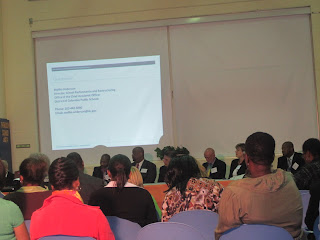
What started out as a simple plan to expand popular restaurant Hank’s Oyster Bar has turned into a lengthy legal process between Hank’s owner, the Dupont Circle Citizens Association (DCCA), and a group of 22 protesting residents from the Dupont area.
The three groups met Wednesday before the Alcoholic Beverage Regulation Administration (ABRA) to discuss an update of the situation.
Thus far, none of the groups had updates to report and there was confusion over whether the DCCA was actually playing a part in the situation at all.
Chairperson of the ABRA Charles Brodsky asked Robin Diener, the President and representative for the DCCA, to leave the protestors table since she had not properly filed a protest against Hank’s.
The meeting was quick and perfunctory, though there was an air of frustration in the room.
Hank’s Oyster Bar, located at 1624 Q Street NW, opened in 2005 after a long negotiation process with several neighbors and the DCCA. Owner and Head Chef Jamie Leeds agreed to a voluntary agreement with the two groups which regulates policies such as hours of operation, seating capacity and prohibited expansion.
The original agreement stated that Hank’s would not be allowed to expand. Since the restaurant was located next to an area with residential zoning, there was no controversy over the topic.
“This really began last year when the Alcoholic Beverage Control Board renewed the East Dupont Moratorium,” said Victor Wexler, a commissioner for the Advisory Neighborhood Commission (ANC).
Wexler explained that under the new moratorium two establishments would be able to expand laterally. Hank’s was one such establishment that was given permission to expand.
Leeds put plans in effect to purchase the vacant property next to her restaurant, at 17th and Q streets Northwest. The ANC approved both her application for the property to be rezoned to commercial property and her request for an expansion.

ANCs cannot pass binding legislation; however, DC Government agencies are required to pay close attention to their actions and recommendations, according to Borderstan.com.
The process to expand Hank’s continued when Leeds decided to terminate her voluntary agreement.
An establishment is permitted to terminate a voluntary agreement when its liquor license is up for renewal and it has operated under the agreement for four years. Hank’s has met both of these requirements, affording Leeds the chance to terminate her agreement.
The DCCA was notified of her desire to vacate the voluntary agreement and was given the option to terminate or amend the agreement.
“We said we would be happy to support the amending of the voluntary agreement to allow Hank’s to expand,” said Diener.
Diener said that members of the DCCA thought they were in support of Hank’s since they were happy to allow the expansion; however, they want to keep the voluntary agreement.
“We are seen as being against Hank’s which is not the case,” Diener said. “We see the voluntary agreement as a tool in our community to get things done; it improves relationships between businesses and neighbors, and helps everybody to talk through. We’re just frustrated with the owner that she doesn’t even want to talk to us and she won’t consider amending the voluntary agreement.”
Leeds has refused to talk to the DCCA without her lawyer present and is adamant about terminating, not amending the voluntary agreement.
“I want to be able to expand my restaurant and not have to operate my restaurant with the rules set up by other people in the neighborhood,” Leeds said. “I’m a seasoned restaurant operator and I know what I’m doing; I don’t need to be told how to run a restaurant.”
“Voluntary agreements are not really voluntary, you’re forced into it,” she said. “The name is not really fair.”
The meeting before the ABRA ended with plans to meet again in October. Each side will be given one hour to present its case to the board, and the ABRA will decide what will happen with the voluntary agreement and the proposed expansion.





